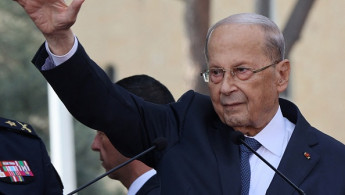Former Lebanese President Aoun to meet with Assad in Syria: Lebanese media
Lebanese media reported that former Lebanese President Michel Aoun travelled to Syria to meet with Syrian President Bashar al-Assad on Tuesday as Lebanese politicians debate whether to elect a pro-Syria candidate for president.
Aoun, the founder of the Christian Free Patriotic Movement (FPM), is a former military foe of Syria, fighting against Syrian forces in the 90s before being forced into exile in France.
His tenure in office from 2016 until 2022 saw him adopt a friendlier position towards Syria and dispatch ministers to Damascus to secure the return of Syrian refugees to their country.
His son-in-law and current head of the FPM, Gebran Bassil, has revoked his support for the presidential candidacy of Sleiman Frangieh, a pro-Hezbollah figure known for his close ties with the Assad family.
Instead, Bassil has nominated an alternative presidential candidate: Jihad Azour, a former Minister of Finance, as well as IMF Director for the Middle East and Central Asia.
Azour's candidacy has gained the backing of Lebanon's other Christian political party, the Lebanese Forces, as well as 23 independent MPs.
Speaker of Lebanon's parliament Nabih Berri called for a session on 14 June to vote for a new president.
Azour's nomination has provoked ire in Hezbollah, with MP Hassan Fadlallah telling the opposition on Sunday to not "over exhaust yourselves and waste time, [Azour] will not reach the Baabda palace."
The New Arab asked the Deputy Head of the FPM, May Khoreich, for comment on Aoun's visit to Syria and its implications for the party, but she declined.
Aoun's visit to Syria occurs as neighbouring states, Lebanon included, normalise relations with the Syrian regime.
The regime was previously an international pariah for its bloody crackdown on protesters during the country's 2011 revolution.
Lebanon, in particular, is interested in cooperating with the Syrian regime to facilitate the return of the around 1.8 million Syrian refugees it hosts, despite concerns that the country is not safe for repatriation.





 Follow the Middle East's top stories in English at The New Arab on Google News
Follow the Middle East's top stories in English at The New Arab on Google News
![MP Essam Diab's pursuit to block TikTok in Egypt has revived an already ongoing debate in the country. [Getty]](/sites/default/files/styles/image_330x185/public/1230748046.jpeg?h=a5f2f23a&itok=-8MqBLLC)

